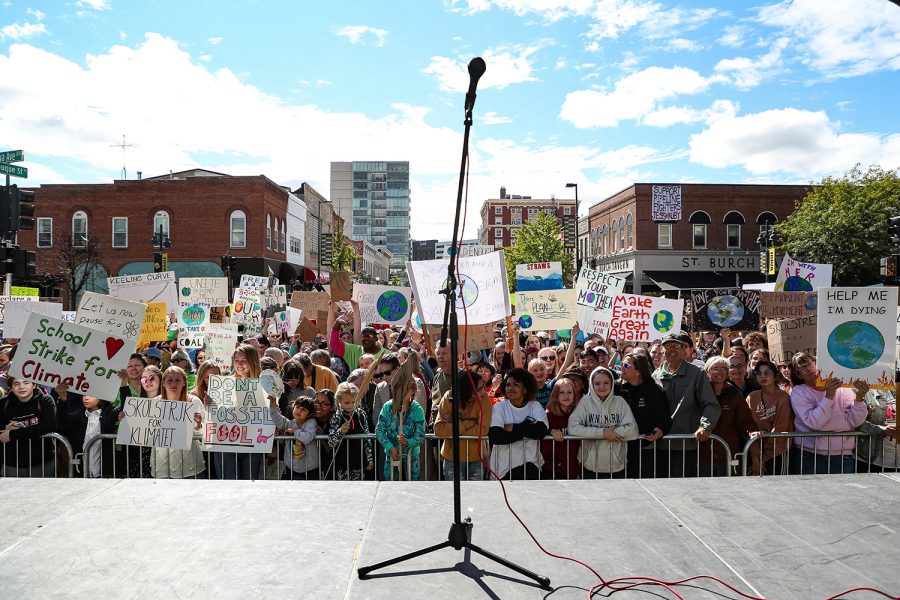Iowa entities join declaration to commit to Paris Climate Agreement goals after federal withdrawal
Iowa City is one of 26 parties to sign the “We Are Still In” declaration, which challenges the Trump administration’s planned withdrawal from the Paris Climate Agreement.
Protestors crowd in front of the stage to hear Swedish climate activist Greta Thunberg speak at the Iowa City Climate Strike in downtown Iowa City on Friday, Oct. 4, 2019. (David Harmantas/For The Daily Iowan)
November 19, 2019
Johnson County, Iowa City, and 25 other Iowa entities recently opted to keep working toward the climate-action goals outlined by the Paris Climate Agreement, despite the Trump administration beginning the process to withdraw from the pact earlier this month.
Those entities signed onto a declaration called “We Are Still In,” in which 3,832 leaders representing 158.6 million people have pledged their continued alignment with the agreement’s goals.
The declaration was released in June 2017, and since its release, cities, states, tribes, businesses, universities, health-care organizations, and faith groups across all 50 states have joined the movement.
Johnson County and Iowa City are among the growing number of supporters for the declaration. In alignment with the city’s Climate Action Plan, the choice to join the movement is the result of Iowa City’s work addressing climate issues for the past 10 years, Iowa City Sustainability Coordinator Brenda Nations said.
“It’s the council’s decision to take part in a global proposed solution to a global problem,” Nations said. “But also, for making life better for Iowa City and the residents here and figuring out how we can adapt to climate change.”
Nations said one of her main tasks when she began working for the city was to conduct greenhouse-gas inventories for the city, and she has been working on issues dealing with the climate ever since. Iowa City has focused on climate-related issues for the past 10 years, she said, but plans have really “ramped up” in the last four.
The city set its emissions-reduction target in December 2016 — right before Donald Trump took office as president — to align with the same targets the United States had agreed to in the Paris Climate Agreement.
Nations said the city has maintained its goals since 2016 through its Climate Action Plan and the Global Covenant of Mayors for Climate and Energy.
Johnson County Board of Supervisors Chair Lisa Green-Douglass said the decision to honor the Paris Climate Agreement in the county’s resolution was internal. Similar to the city, Johnson County has remained committed to the goals of the agreement established in 2016, she said.
“The City of Iowa City has very serious and rigorous greenhouse-emission-reduction plans and so, we’re not inconsistent with what they have done,” Green-Douglass said.
RELATED: City Council declares a state of climate crisis
Both Johnson County and Iowa City have implemented programs to reduce greenhouse-gas emissions at the government and community levels, Nations said. The University of Iowa has been working with the city for the last decade and has reduced its use of coal by two-thirds within that time period, Nations added.
UI Environmental Coalition Co-President Emily Manders said she works with the UI community to be more sustainable, while holding the university accountable for its environmental footprint.
Currently, the coalition works primarily with the UI, but Manders said she hopes to create a more collaborative effort between the coalition and Iowa City in the near future.
“I think the UI Environmental Coalition working with the city would be the next target for us … and it would be nice to work with people of different ages, experience, and backgrounds,” Manders said.
RELATED: UISG, GPSG unanimously pass resolution to fight climate change
The decision by Johnson County and various Iowa entities to remain aligned with the goals of the Paris Climate Agreement largely has to do with the need for city governments to take action where the federal government is not, Nations said.
“I am in a national organization with other sustainability coordinators and what I have been hearing is that there is not a lot happening on a federal level,” she said. “What I see is that cities are reeling, leading the way, and I think it’s important for us to be involved.”
The City of Iowa City released its 100 Day Report on accelerating climate action Nov. 15 and described in 39 pages of detail the steps the city has taken since initially declaring a climate emergency in August.
According to City Council documents, the city has created 64 actions to count towards its goal of achieving 45 percent reduction in carbon emissions by 2030 and reaching net-zero by 2040. Half of its actions will be dedicated to beginning in 2020, the documents read.
The urgency of issues related to greenhouse-gas emissions makes this declaration more important, Green-Douglass said. The decision at the federal level to withdraw from the agreement goes against scientific findings that climate action must be taken immediately, she said.
The United Nations’ Intergovernmental Panel on Climate Change released a report in 2018 that outlined the measures needed to keep the global temperature from climbing more than 1.5 degrees Celsius. Many measures outlined included reducing carbon emissions to net-zero by 2050, which required governments to meet benchmarks by 2030, just 12 years after the report will have been released.
“Everybody and every entity needs to do this, the science has been done… we’ve got 11 years,” Green-Douglass said. “If we don’t reduce [carbon emissions], the damage will be irreversible. If we start now, we can mitigate the damage that has been done.”



